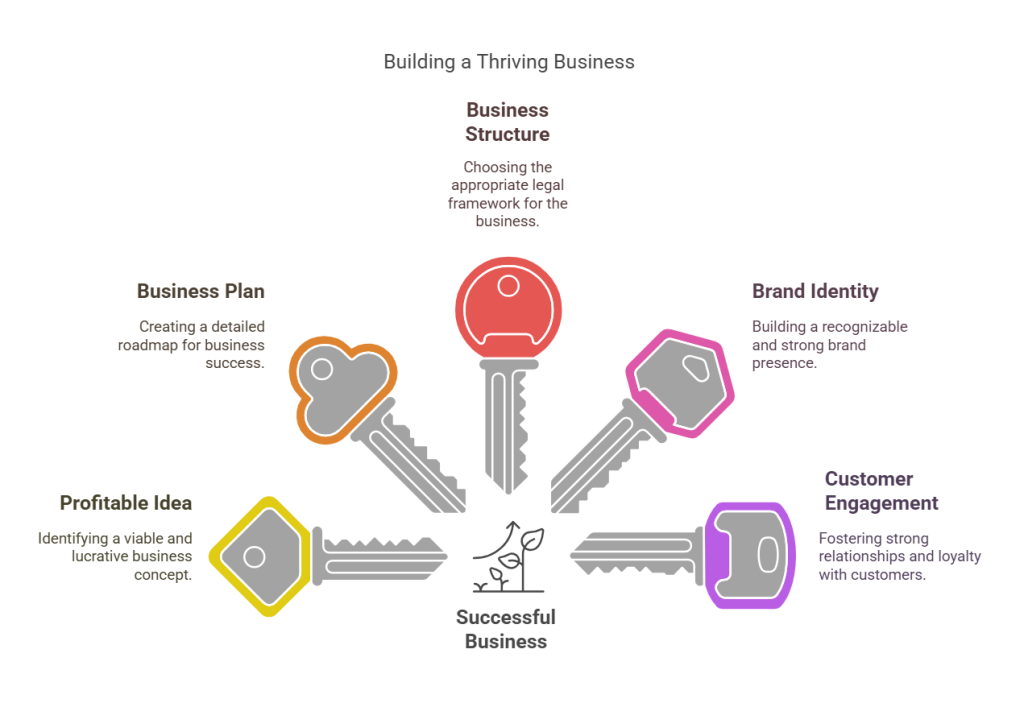 Starting your own business is an exciting opportunity, but it requires thoughtful planning and effort. Knowing how to start a successful business involves understanding key steps that drive results. However, many entrepreneurs struggle to know where to begin or what to prioritize. By focusing on the right strategies, you can set your business up for long-term success.
Starting your own business is an exciting opportunity, but it requires thoughtful planning and effort. Knowing how to start a successful business involves understanding key steps that drive results. However, many entrepreneurs struggle to know where to begin or what to prioritize. By focusing on the right strategies, you can set your business up for long-term success.
Additionally, building a strong foundation is essential for growth. From developing a clear business plan to managing finances effectively, every decision matters. Therefore, taking time to understand these elements will help you navigate challenges and make informed choices. With the right approach, you can create a business that meets your goals and stands out in the market.
Developing a Business Idea and Identifying Your Niche
Developing a compelling business idea begins with identifying your passions and skills. Reflect on activities you enjoy and excel at; this alignment often leads to sustainable ventures. For instance, if you have a knack for crafting, consider exploring related business opportunities. Additionally, pay attention to common frustrations or challenges you encounter daily. These pain points can inspire innovative solutions that form the basis of a successful business. By focusing on areas where your interests and abilities intersect, you lay a strong foundation for your entrepreneurial journey.
To identify market gaps and assess demand, conduct thorough research. Analyze existing products and services to spot shortcomings or areas lacking innovation. Customer reviews and feedback are valuable resources for uncovering unmet needs. Furthermore, monitor industry trends to anticipate emerging demands. By staying informed, you can position your business to address these gaps effectively. This proactive approach not only highlights opportunities but also guides you in tailoring your offerings to meet market needs.
Understanding your target audience is crucial. Define who your potential customers are and delve into their preferences and behaviors. Engage with them through surveys or social media to gather insights. This direct interaction reveals their needs and expectations, allowing you to tailor your products or services accordingly. By aligning your offerings with customer desires, you enhance satisfaction and foster loyalty. This customer-centric strategy is essential when considering how to start a successful business.
Creating a Solid Business Plan
Creating a solid business plan is a fundamental step in how to start a successful business. A comprehensive plan typically includes several key components. The executive summary provides a brief overview of your business concept and goals. Following this, the company description outlines your mission, values, and the specific problems your business aims to solve. Market analysis delves into industry trends, target market insights, and competitor evaluations. Your marketing strategy details how you intend to attract and retain customers, while financial projections forecast revenue, expenses, and profitability. These sections work together to present a clear and compelling picture of your business’s potential.
A well-crafted business plan serves multiple purposes. It acts as a roadmap, guiding your strategic decisions and helping you stay focused on your objectives. Moreover, it is essential when seeking funding from investors or lenders, as it demonstrates the viability and profitability of your business idea. By articulating your vision and the steps to achieve it, you build credibility and instill confidence in potential stakeholders. Therefore, investing time in developing a thorough business plan can significantly impact your business’s success.
To assist in creating your business plan, various tools and templates are available. The U.S. Small Business Administration offers a detailed guide on writing a business plan, providing step-by-step instructions and sample templates. Additionally, platforms like Canva and Microsoft Create provide free, customizable business plan templates that can be tailored to your specific needs. These resources can simplify the planning process, ensuring you cover all essential aspects comprehensively.
Understanding Legal and Financial Requirements
Understanding the legal and financial requirements is essential when considering how to start a successful business. Choosing the appropriate business structure is a critical first step. Options include sole proprietorships, partnerships, limited liability companies (LLCs), and corporations. Each structure has distinct implications for liability, taxation, and operational complexity. For instance, an LLC offers limited liability protection and flexible tax options, making it a popular choice for many entrepreneurs. Conversely, a sole proprietorship is simpler to establish but doesn’t provide personal liability protection. Therefore, it’s important to assess which structure aligns best with your business goals and risk tolerance.
Once you’ve selected a business structure, registering your business and obtaining the necessary licenses or permits is the next step. Registration requirements vary by state and locality, so it’s important to consult your state’s business registration office for specific guidelines. Additionally, certain industries require specific licenses or permits to operate legally. For example, businesses selling alcohol or firearms need federal licenses, while restaurants must adhere to local health department regulations. Therefore, researching the specific requirements for your industry and location is essential to ensure compliance.
Setting up a dedicated business bank account is another important aspect of managing your business finances. Separating personal and business finances simplifies accounting and provides a clear financial picture of your operations. Additionally, it’s important to understand your tax obligations, which depend on your chosen business structure. For instance, sole proprietors report business income on their personal tax returns, while corporations file separate tax returns. Therefore, consulting with a tax professional can help you navigate these complexities and establish effective financial practices from the outset.
Building a Strong Brand and Online Presence
Building a strong brand and online presence is essential when considering how to start a successful business. Begin by crafting a compelling brand identity that reflects your company’s values and resonates with your target audience. This involves selecting a memorable name, designing a distinctive logo, and developing clear messaging that communicates your mission. Consistency across all platforms reinforces your brand’s image and fosters recognition. Therefore, invest time in creating cohesive visual and verbal elements that set your business apart.
In today’s digital age, having a professional website is indispensable. It serves as your business’s online storefront, providing information about your products or services and facilitating customer interactions. Additionally, leveraging social media platforms can significantly enhance your reach. By engaging with potential customers on channels like Facebook, Instagram, or LinkedIn, you can build relationships and increase brand awareness. Regularly sharing valuable content keeps your audience informed and interested. Thus, integrating a robust online strategy is key to expanding your business’s visibility.
Building customer trust and engagement requires deliberate strategies. Transparency in your operations and responsiveness to customer inquiries demonstrate reliability. Encouraging and showcasing customer reviews can also build credibility. Moreover, offering personalized experiences makes customers feel valued. By understanding their preferences and tailoring your services accordingly, you foster loyalty. Therefore, prioritize open communication and customer-centric practices to cultivate lasting relationships.
Marketing and Growing Your Customer Base
Developing an effective marketing strategy is essential when considering how to start a successful business. Begin by identifying your target audience and understanding their needs. This insight allows you to create content that resonates with them. Content marketing, such as informative blog posts or engaging videos, can attract and educate potential customers. Additionally, optimizing your website for search engines (SEO) improves visibility, making it easier for prospects to find you. Leveraging social media platforms further amplifies your reach, enabling direct interaction with your audience. Therefore, integrating these elements creates a cohesive strategy that drives engagement and growth.
Networking within your industry also plays a significant role in business growth. Attending industry events and participating in online forums can help you connect with peers and potential partners. Building these relationships can lead to collaborations and referrals, expanding your customer base. Moreover, engaging with industry influencers can enhance your credibility and visibility. Therefore, actively cultivating these connections is beneficial for your business’s expansion.
Retaining customers and building loyalty are equally important. Providing exceptional customer service ensures satisfaction and encourages repeat business. Additionally, personalized communication, such as tailored emails or special offers, makes customers feel valued. Implementing loyalty programs can also incentivize repeat purchases. Furthermore, seeking and acting on customer feedback demonstrates your commitment to improvement. By focusing on these strategies, you foster long-term relationships that contribute to sustained success.
Managing Finances and Scaling Your Business
Effectively managing your finances is essential when considering how to start a successful business. Begin by creating a detailed budget that outlines your projected income and expenses. Regularly monitor your cash flow to identify patterns and anticipate shortfalls. Additionally, track all expenses meticulously to pinpoint areas where you can reduce costs. By maintaining a clear financial picture, you can make informed decisions and avoid unexpected financial challenges.
Knowing when and how to scale your business is equally important. Look for consistent demand that exceeds your current capacity as a signal to expand. When scaling, consider hiring additional staff to manage increased workloads. Expanding operations, such as opening new locations or enhancing production capabilities, can also support growth. However, it’s important to scale gradually to maintain quality and manage resources effectively.
As your business grows, you’ll encounter common challenges that require adaptability. Managing increased operational complexity can strain existing processes. Therefore, it’s important to implement efficient systems and delegate responsibilities appropriately. Additionally, staying attuned to market trends allows you to pivot strategies as needed. By embracing flexibility and continuous improvement, you can navigate growth challenges successfully.
Conclusion
Starting a business takes careful planning and dedication. However, by addressing the right areas, you set yourself up for success. Understanding your niche, creating a solid business plan, and managing finances are all foundational steps. Additionally, building a strong brand and engaging with customers consistently help drive growth. These elements work together to create a sustainable and profitable business.
As you continue, remember the importance of adaptability. Markets shift, and challenges arise, but flexibility helps you respond effectively. Therefore, stay informed, assess your progress regularly, and make adjustments where needed. Success often comes through persistence and learning from each step along the way.
If you’re wondering how to start a successful business, focus on creating value and building strong relationships. By prioritizing these areas, you’ll develop a business that not only thrives but also continues to grow.



